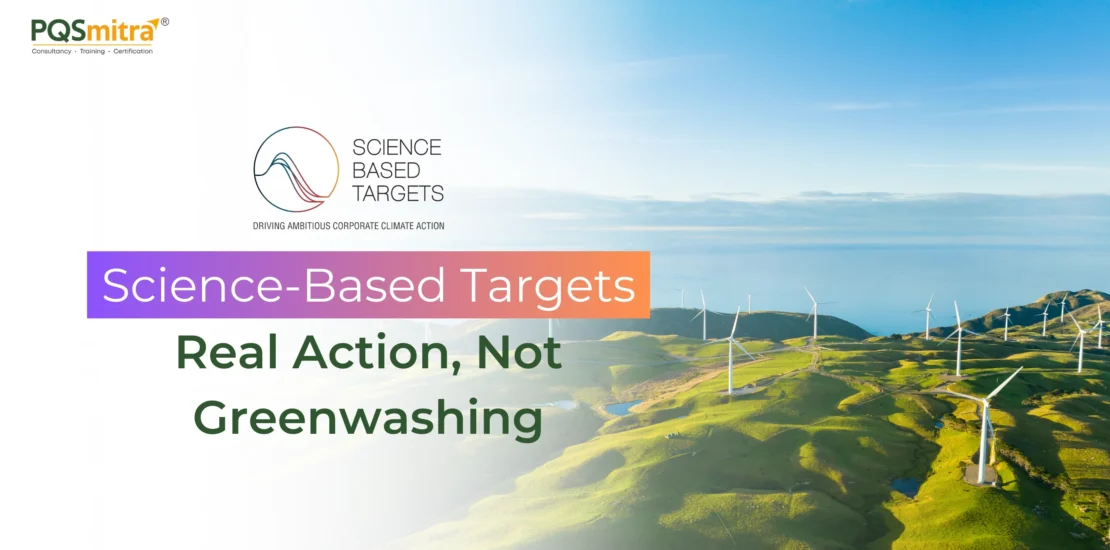Science-Based Targets vs. Greenwashing: Ensuring Authentic Corporate Sustainability
- April 22, 2025
- Posted by: PQS_Mitra_Main_Access
- Category: Environmental Social and Governance (ESG)

Introduction
Sustainability is no longer a choice—it’s a necessity. As climate change accelerates, businesses face growing pressure to cut their carbon footprint. However, in the race to appear eco-friendly, many companies fall into the trap of greenwashing—making misleading claims about their sustainability efforts. On the other hand, science-based targets (SBTs) provide a clear, credible path for businesses to reduce emissions in line with climate science.
So, what exactly is the difference between genuine sustainability efforts and greenwashing? Let’s break it down in simple terms.
What is Greenwashing?
Greenwashing occurs when companies exaggerate or falsify their environmental efforts to appear more sustainable than they actually are. This can be done through misleading marketing, vague claims, or even by highlighting minor eco-friendly initiatives while ignoring larger environmental issues.
For example, a company might advertise its “green” packaging while still being one of the biggest polluters in its industry. Or it might launch a small carbon offset program while continuing high levels of emissions. Greenwashing focuses on appearances rather than real change.
Why is Greenwashing a Problem?
Greenwashing isn’t just bad for the environment—it also erodes trust. When consumers, investors, and stakeholders realize that a company’s sustainability claims are empty, it can damage its reputation. Regulatory bodies are also cracking down on greenwashing, meaning businesses that engage in its risk facing legal consequences.
More importantly, greenwashing distracts from real climate action. Instead of investing in impactful changes, businesses spend time and resources on marketing gimmicks. This delays progress in the fight against climate change.
What Is Science-Based Targets (SBTs)?
Science-based targets (SBTs) offer a way for businesses to set credible and measurable sustainability goals. These targets are aligned with the latest climate science to help companies reduce their greenhouse gas (GHG) emissions in a way that actually contributes to limiting global warming.
The Science-Based Targets initiative (SBTi) helps companies set emission reduction goals based on scientific data. Unlike vague sustainability promises, SBTs ensure that a company’s climate actions are effective and transparent.
Key Features of Science-Based Targets:
Measurable Goals – Companies commit to reducing emissions by specific percentages within set timelines.
Based on Science – The targets align with global climate goals, like the Paris Agreement’s aim to limit warming to 1.5°C.
Third-Party Validation – The SBTi verifies and approves company targets, ensuring they are legitimate and achievable.
Ongoing Accountability – Companies must track and report progress, preventing greenwashing.
How Businesses Benefit from Science-Based Targets
Increased Credibility – SBTs show stakeholders that your company is serious about sustainability.
Regulatory Compliance – Many governments are introducing stricter climate policies, and having SBTs in place helps businesses stay ahead of regulations.
Competitive Advantage – Companies that genuinely commit to sustainability attract eco-conscious customers and investors.
Cost Savings – Reducing emissions often means improving efficiency, which can lead to lower energy and operational costs.
Stronger Brand Reputation – Being recognized for authentic sustainability efforts builds trust and loyalty among customers.
How PQSmitra Supports Businesses in Achieving Science-Based Targets
Setting and implementing science-based targets can be challenging without expert guidance. This is where PQSmitra comes in. As a trusted consultant, PQSmitra helps businesses navigate the complexities of sustainability by providing end-to-end support. From assessing current emissions to setting realistic SBTs and ensuring compliance with global standards, PQSmitra ensures that your sustainability strategy is both credible and impactful. By working with experts, businesses can avoid the pitfalls of greenwashing and implement meaningful climate action that drives real change.
How to Identify Greenwashing vs. Genuine Sustainability Efforts
To distinguish real sustainability efforts from greenwashing, ask these questions:
– Are the claims backed by data? Companies committed to sustainability provide measurable goals and track their progress.
– Is there third-party verification? Reputable businesses seek certifications or validations from organizations like the SBTi.
– Are the efforts company-wide or just marketing tactics? Genuine sustainability strategies cover the entire business operation, not just one aspect.
– Does the company report its progress transparently? Regular updates and detailed reporting indicate authenticity.
Conclusion
Sustainability is not about catchy slogans or trendy green campaigns—it’s about real impact. Science-based targets offer a practical, verifiable way for businesses to contribute to climate action while avoiding the risks of greenwashing. Companies that take sustainability seriously will not only help the planet but also build stronger brands, gain customer trust, and stay ahead in an evolving regulatory landscape.
If your business wants to set and achieve genuine sustainability goals, partnering with our experts can make all the difference. Make sustainability a reality, not a marketing tactic. Partner with PQSmitra for science-backed climate action today!
Leave a Reply Cancel reply
Kindly submit a business inquiry online and we will get back to you!
OR
Call us on 022-2893 8687 | +91-9820204373
